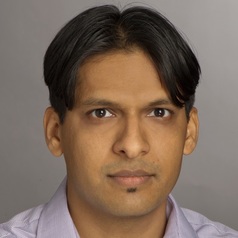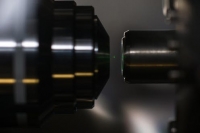
Mishkat Bhattacharya
Associate Professor in the School of Astronomy, Rochester Institute of Technology
I have a PhD (University of Rochester) in experimental atomic physics, having worked on laser cooled and trapped atoms with applications to precision spectroscopy and cold molecule formation.
I have postdoctoral experience (Georgia Institute of Technology, University of Arizona, University of Maryland, College Park) in theoretical quantum optics, which is my research area currently.
My current focus is on optomechanics. I have worked extensively on cavity optomechanics; my group pioneered the theoretical study of the more recent field of levitated optomechanics without optical cavities (optical tweezers). I have authored invited reviews on the latter topic for trade journals such as Optics and Photonics News; and organized an incubator meeting for the Optical Society of America also on the same topic.
I have published 47 peer-reviewed articles in journals such as Physical Review Letters, Optica and Optics Express. I have presented my work in 83 talks, about half of them invited, including in countries such as Australia, Taiwan and Japan.
I have accrued continuous research funding since 2011 and my student Hao Shi won the prestigious Leroy Apker Award of the American Physical Society for undergraduate research in 2013. My collaborations include researchers at Yale, Northwestern, the University of College Park in Maryland, the University of Rochester, and the University of Washington. My research has been publicized in the Cern Courier, Photonics.com, the Rochester Business Journal, Newsletter of the American Physical Society, Physorg.com, Nanowerk.com and NeoFronteras.com.
How do superconductors work? A physicist explains what it means to have resistance-free electricity
Mar 28, 2023 14:25 pm UTC| Science
The modern world runs on electricity, and wires are what carry that electricity to every light, television, heating system, cellphone and computer on the planet. Unfortunately, on average, about 5% of the power generated...

Experiments with optical tweezers race to test the laws of quantum mechanics
Nov 08, 2018 16:56 pm UTC| Insights & Views Law Technology
One might think that the optical tweezer a focused laser beam that can trap small particles is old hat by now. After all, the tweezer was invented by Arthur Ashkin in 1970. And he received the Nobel Prize for it this...
- Market Data



































